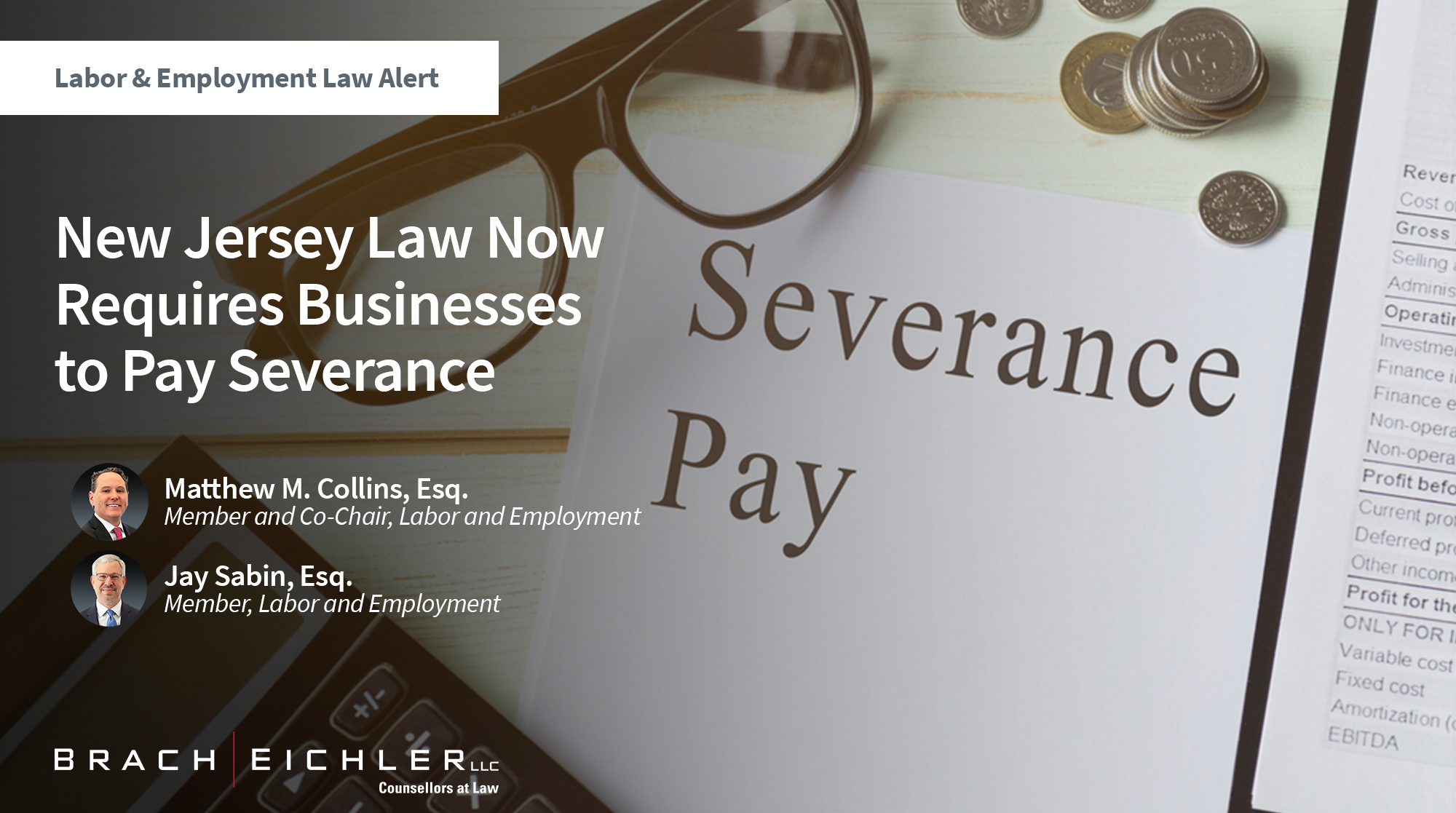Labor and Employment Alert: New Jersey Law Now Requires Businesses to Pay Severance
NJ is the second state to require severance pay upon certain types of terminations

February 18, 2020
Thank you Toys R Us – not for the fond memories from another lost retailer, but for giving New Jersey employers a new law requiring businesses to pay severance upon certain types of employment terminations. The law also broadly identifies who may be responsible if the nominal employer cannot pay, and the list includes individuals, potentially investors, and other related business that acted “directly or indirectly” in the nominal employer’s interest. Before initiating a large layoff, prudence dictates that you check your D&O policies and obtain legal counsel about the breadth of this law’s reach.
As of July 19, 2020, a business that has had any employees anywhere in New Jersey for more than three years will owe severance if:

Follow Us on LinkedIn
Stay updated with our latest news and insights.
(i) the business’s physical operations move, permanently or temporarily, to another location and, as a result, the business terminates the employment of at least 50 New Jersey employees (a “plant relocation”);
(ii) the business’s physical operations shutter and, as a result, the business terminates the employment of at least 50 New Jersey employees (a “plant shuttering”); or
(iii) the business, for any reason, terminates the employment of at least 50 employees working at or reporting to a New Jersey operation (a “mass layoff”).
50 is the new 500, as the law previously required only notice, not severance, upon a mass layoff involving 500 employees (or at least 50 if it constituted a third of the workforce). The law continues to require notice – now a 90-day advance notice – in the event of a plant relocation, a plant shuttering, or a mass layoff.
What Types of Employment Terminations Trigger Severance?
Severance is due only if the requisite number of terminations occur within a 30-day period. The law details what “counts” as an employment termination.
How Much Severance Is Due?
Affected employees are entitled to receive severance pay equal to one week of pay for each full year of employment. The rate of pay is generally the employee’s rate at time of termination. The law does not specifically address how many hours the rate should be multiplied by for part-time employees. In addition, if the employer does not provide the required 90-day advance notice, severance is increased by another four weeks of pay.
Who Is Responsible For Paying Severance?
The new law provides an expansive list of related businesses, investors, and individuals who may be responsible for paying the severance, including:
- The nominal employer;
- Any individual acting directly or indirectly in the interest of the nominal employer;
- Any partnership acting directly or indirectly in the interest of the nominal employer;
- Any association acting directly or indirectly in the interest of the nominal employer;
- Any person or group of persons acting directly or indirectly in the interest of the nominal employer.
The new law underscores the breadth of this financial responsibility by providing that responsible entities and persons include “any person” who:
- Directly or indirectly, owns and operates the nominal employer, or
- Owns a corporate subsidiary that (i) directly or indirectly, owns and operates the nominal employer or (ii) makes the decision responsible for the employment action that gives rise to a mass layoff.
The new law does not define “person” but it generally extends under New Jersey law to corporations, companies, associations, societies, firms, partnerships, and joint stock companies as well as individuals. (N.J. Stat. Ann. §1:1-2.)
Bankruptcy Priority
The law, by characterizing the severance “as compensation… earned in full upon the termination of the employment relationship,” seeks to obtain better priority for employee severance in bankruptcy proceedings. In the Third Circuit, the courts “distinguish between two types of severance pay: (1) pay at termination in lieu of notice; and, (2) pay at termination based on length of employment” (In re Roth American, Inc., 975 F.2d 949, 957 (3d Cir. 1992)), the result of which is that employees are often left with a small fraction of their severance pay if they lose their jobs during a bankruptcy. The new law seeks to change that calculus.
Looking Ahead
Planning. Carefully plan for any action that could result in 50 or more employment terminations. The law invites interpretation on a number of important issues, including what constitutes a mass layoff and how to assess whether separately conducted employment terminations should be aggregated. Any individual – officers, directors, private equity investors – should seek legal advice before being involved in the type of employment terminations for which severance may be due. Directors and officers should also ensure that D&O insurance coverage extends to personal liability under the new law.
Coordination With Company-Provided Severance Pay. Because the law prohibits severance pay waivers (unless approved by the State or a court), severance mandated by the law will likely not be sufficient consideration for a general release and severance.
Litigation. Federal pre-emption will likely not be a fruitful area for seeking to enjoin enforcement of the law, as the Supreme Court more than 30 years ago in Fort Halifax Packing Co. v. Coyne, 482 U.S. 1 (1987) upheld a strikingly similar Maine law.
Bankruptcy Proceedings. There will likely continue to be argument that, based on Roth, severance should not be classified as an administrative priority.
If you have any questions about this alert or any other labor and employment issue, please contact:
Matthew M. Collins, Esq., Member and Co-Chair, Labor and Employment Practice, at mcollins@bracheichler.com or 973.403.3151
Jay Sabin, Esq., Member, Labor and Employment Practice, at jsabin@bracheichler.com or 917.596.8987














